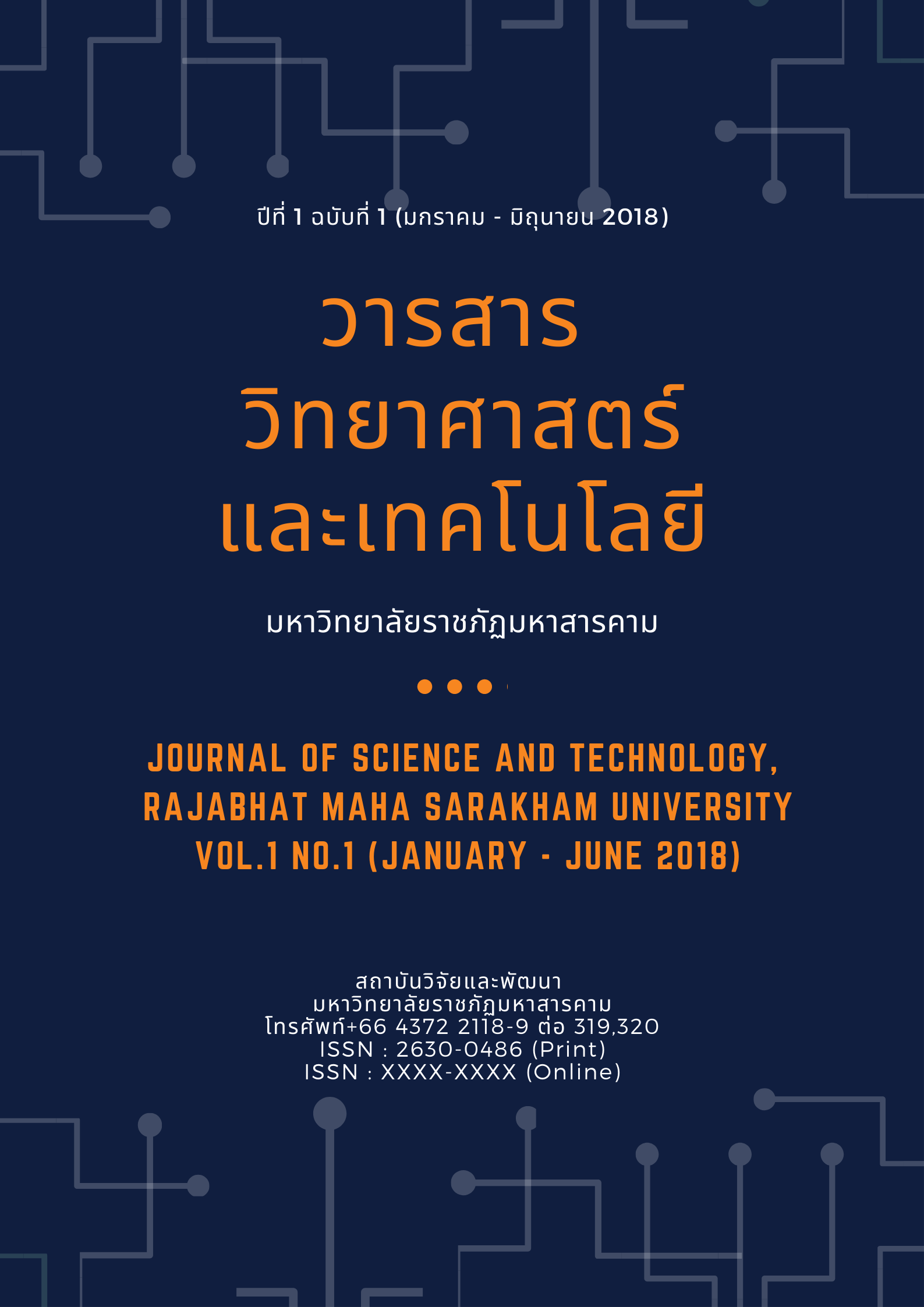Cellulose Extraction from Cyperus Corymbosus Rottb L. for Dietary Fiber
Keywords:
Cyperus Corymbosus Rottb L., Saline soil, Cellulose, dietary fibersAbstract
The aims of this research were to study the cellulose extraction methods of Cyperus Corymbosus Rottb L. in saline soil and general soil and study the chemical compositions of Cyperus Corymbosus Rottb L. for the potential application in the food industry and finding alternative sources of cellulose. In the present-day, Thailand has introduced many kinds of plants to extract the cellulose, but still need to import from abroad due to insufficient quantity. The Cyperus Corymbosus Rottb L. is one alternative plants to use because it inexpensive and salty weed.
The Cyperus Corymbosus Rottb L. in saline soil and general soil were observed the moisture at 2.04% and 2.67%, ash at 2.64%, 2.32%, alpha-cellulose at 43.73%, 51.61%, Holocellulose at 97.02%, 70.52% and lignin at 14.92%, 17.30%, respectively. The extraction recoveries of cellulose for Cyperus Corymbosus Rottb L. in saline soil and general soil were 81.91% and 88.74%, respectively. The cellulose structure was characterized by Fourier-transform infrared spectroscopy (FT-IR) and X-ray diffraction (XRD). According to the studies, it has been found that Cyperus Corymbosus Rottb L. in saline soil and general soil revealed the high fiber content indicating that the Cyperus Corymbosus Rottb L. in saline soil and general soil can be used to the raw material dietary fiber, which is the low energy.
References
จันทร์รัตน์ เลิศมโนรัตน์และคณะ. (2539). การใช้เซลลูโลสที่สกัดจากกากอ้อยในผลิตภัณฑ์เค้กช็อกโกแลตแคลอรีต่ำ. ปริญญานิพนธ์วิทยาศาสตร์มหาบัณฑิต, กรุงเทพมหานคร: จุฬาลงกรณ์มหาวิทยาลัย.
จุฬาลักษณ์ วงศ์สรรเสริญและคณะ. (2544). การใช้เซลลูโลสผงที่ผลิตจากเปลือกถั่วเหลืองและเปลือกถั่วเขียวเพื่อลดการอมน้ำมันในปาท่องโก๋. ปริญญานิพนธ์วิทยาศาสตร์มหาบัณฑิต, กรุงเทพมหานคร:จุฬาลงกรณ์มหาวิทยาลัย.
บรรจบ ชุณหสวัสดิกุลและปาริชาติ สักกะทำนุ. (2539). คุณค่าอาหารเส้นใยป้องกันบำบัดสารพัดโรค. กรุงเทพมหานคร: รวมทัศน์.
ปิยพร พยัฆพรม. (2558). การควบคุมคุณภาพของสมุนไพร. องค์การเภสัชกรรม. 22(4): 1-7.
ปรีชา เกียรติกระจาย. (2528). เคมีของเนื้อไม้. ภาควิชาวนผลิตภัณฑ์. คณะวนศาสตร์:มหาวิทยาลัยเกษตรศาสตร์.
นิธิยา รัตนาปนนท์. (2537). โภชนศาสตร์เบื้องต้น. กรุงเทพมหานคร: โอเดียนสโตร์.
นันทนา สิทธิชัย. (2547). มาตรฐานของสมุนไพรในตำราตามมาตรฐานยาสมุนไพรไทย. กรุงเทพมหานคร: สำนักยาและวัตถุเสพติด.
วิทยา ปั้นสุวรรณ, ปริศนา สิริอาชา, สุชาดา อุชชิน, บุญฤทธิ์ ชูประยูร, บุศรินทร์ คงเสรี, จารุวรรณ ไผ่ทอง, เนตร ชนก สิริพงศ์พันธ์. (2549). การผลิตเยื่อที่มีแอลฟาเซลลูโลสสูง และไซโลสจากชานอ้อยและซังข้าวโพดโดยวิธีระเบิดด้วยไอน้ำ.ปทุมธานี : สำนักงานพัฒนาวิทยาศาสตร์และเทคโนโลยีแห่งชาติ.
รุ่งทิพย์ ลุยเลา. (2559). การแก้ปัญหาสิ่งแวดล้อมในมุมมองของนักออกแบบ กรณีศึกษา: การสร้างมูลค่าเพิ่มด้วยกระบวนการย้อมสีทะลายปาล์มเปล่าที่เหลือจากการผลิตน้ำมันปาล์ม. วารสารสิ่งแวดล้อม. 20(1): 54-62.
ศศิเกษม ทองยงค์และพรรณี เดชกำแหง. (2530). เคมีอาหารเบื้องต้น. กรุงเทพมหานคร: โอเดียน สโตร์.
ศรัญญา ยิ้มย่อง. (2547). การเปลี่ยนเชิงชีวภาพของแอลฟาเซลลูโลสจากวัชพืชไปเป็นเอทานอล. ปริญญานิพนธ์วิทยาศาสตร์มหาบัณฑิต, จุฬาลงกรณ์มหาวิทยาลัย. กรุงเทพมหานคร.
Ang, J. F. (1991). Water retention capacity and viscosity effect powdered cellulose. J. Food Scince., 56(2), 1682–1684.
Heloisa Tibolla, Franciele Maria Pelissari. (2014). Cellulose nanofibers produced from banana peel by chemical and enzymatic treatment. Campinas University.
Lu P., Hsieh Y.-L. (2012). Preparation and characterization of cellulose nanocrystals from rice straw. Carbohydrate Polymer. 87: 564–573.



